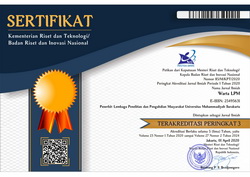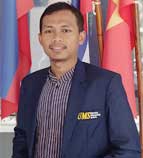Pelatihan Kecakapan Kolaborasi Digital bagi Guru-Guru IPA Sekolah Menengah di Jawa Tengah
DOI:
https://doi.org/10.23917/warta.v25i2.650Keywords:
digital competency, collaboration, RASCH analysis, science teacher, digital trainingAbstract
Collaboration is one of the 21st-century skills that are important to be mastered by teachers or students in the school environment, especially in the scope of science learning (IPA). Science learning requires group and collaborative activities such as practicum in the laboratory for example. However, an outbreak of the Covid-19 pandemic has affected nearly 363.1 million children and adolescents worldwide due to school closures that make group activities and collaboration challenging to do. The outbreak of the Covid-19 pandemic has affected nearly 363.1 million children and adolescents worldwide due to school closures. Many teachers are turning to online classes and transforming their learning into a digital environment. The ability of every science teacher in conducting digital-based learning in terms of collaboration is are not the same, because not all have been prepared for this before. In Indonesia, there are no minimum competency standards that must be mastered by teachers to conduct online learning, including the competence to collaborate digitally. Especially for science teachers, practicum and collaboration in the laboratory cannot be carried out. In fact, laboratory practicum plays a role in increasing scientific competence apart from the transfer of knowledge. Based on these problems, the GutasiPetal (Digital-Competence Literacy for Teacher) team held online training on Digital CompetenceCompetency, particularly in digital collaboration, to strengthen and map the digital collaboration digital competencies of science teachers in Central Java. , as well as improve skills to collaborate online for science learning in a digital environment. The method for the training through Zoom Conference, synchronous simulation, and asynchronous group assignment. Therefore, for evaluating the collaboration skill of the teachers, we assessed the assignment work and analyzed questionnaire results using RASCH Analysis.
Downloads
References
Bambang Sumintono & Wahyu Widhiarso. (2015). Aplikasi Permodelan Rasch pada Assessment Pendidikan. Trim Komunikata Publishing House.
Barak, M. (2017). Science Teacher Education in the Twenty-First Century: a Pedagogical Framework for Technology-Integrated Social Constructivism. Research in Science Education, 47(2), 283–303. https://doi.org/10.1007/s11165-015-9501-y
Boone, W. J., & Staver, J. R. (2020). Advances in Rasch Analyses in the Human Sciences. In Advances in Rasch Analyses in the Human Sciences. https://doi.org/10.1007/978-3-030-43420-5
Boone, W. J., Yale, M. S., & Staver, J. R. (2014). Rasch Analysis in the Human Sciences. In Rasch Analysis in the Human Sciences. https://doi.org/10.1007/978-94-007-6857-4
Carretero, S., Vuorikari, R., & Punie, Y. (2017). DigComp 2.1: The Digital Competence Framework for Citizens. With eight proficiency levels and examples of use. In Publications Office of the European Union. https://doi.org/10.2760/38842
Che Lah, N. H., Tasir, Z., & Jumaat, N. F. (2021). Applying Alternative Method to Evaluate Online Problem-Solving Skill Inventory (OPSI) using Rasch Model Analysis. Educational Studies, 00(00), 1–23. https://doi.org/10.1080/03055698.2021.1874310
Dong, Y., & Li, Q. (2013). Competency-Based Public Servants Training Needs Analysis - Proceedings of 20th International Conference on Industrial Engineering and Engineering Management. 533–541. https://doi.org/10.1007/978-3-642-40072-8
Gavin, B. (2019). The beginner’s guide to google sheets. How to Geek. https://www.howtogeek.com/425040/the-beginners-guide-to-google-sheets/
Hermawan, H., Siahaan, P., Suhendi, E., Kaniawati, I., Samsudin, A., Setyadin, A. H., & Hidayat, S. R. (2017). Desain Instrumen Rubrik Kemampuan Berkolaborasi Siswa SMP dalam Materi Pemantulan Cahaya. Jurnal Penelitian & Pengembangan Pendidikan Fisika, 3(2), 167–174. https://doi.org/10.21009/1.03207
Hidayat, M. L., Hariyatmi, & A., D. S. (2021). Bahan Ajar Kompetensi Digital bagi Calon Pendidik Biologi (H. R. C. M. Taufik Hidayat (ed.)). Alinea Media Dipantara.
Juniati, D., Gerashhenkova, T. M., Shvecova, O. A., Faradillah, A., Hadi, W., & Tsurayya, A. (2017). Implementing Google Apps for Education as Learning Management System in Math Education. IOP Conf. Series: Journal of Physics: Conf. Series 895 (2017) 012053, 895. https://doi.org/10.1088/1742-6596/895/1/012053
Kuzminska, O., Mazorchuk, M., Morze, N., Pavlenko, V., & Prokhorov, A. (2018). Digital Competency of the Students and Teachers in Ukraine: Measurement, Analysis, Development Prospects. CEUR Workshop Proceedings, 2104, 366–379.
Mohmmed, A. O., Khidhir, B. A., Nazeer, A., & Vijayan, V. J. (2020). Emergency Remote Teaching During Coronavirus pandemic: The Current Trend and Future Directive at Middle East College Oman. Innovative Infrastructure Solutions, 5(3), 72. https://doi.org/10.1007/s41062-020-00326-7
Nugraha, A. C., & Hariyanto, D. (2014). Kolaborasi E-Learning dan M-Learning sebagai upaya Peningkatan Kompetensi Mahasiswa pada Mata Kuliah Komunikasi Data.
Schneider, S. L., & Council, M. L. (2020). Distance learning in the era of COVID-19. Archives of Dermatological Research, 0123456789, 3–4. https://doi.org/10.1007/s00403-020-02088-9
Stahre Wästberg, B., Eriksson, T., Karlsson, G., Sunnerstam, M., Axelsson, M., & Billger, M. (2019). Design Considerations for Virtual Laboratories: A Comparative Study Of Two Virtual Laboratories For Learning About Gas Solubility and Colour Appearance. Education and Information Technologies, 24(3), 2059–2080. https://doi.org/10.1007/s10639-018-09857-0
Syah, R. H. (2020). Dampak Covid-19 pada Pendidikan di Indonesia: Sekolah, Keterampilan, dan Proses Pembelajaran. SALAM: Jurnal Sosial Dan Budaya Syar-I, 7(5). https://doi.org/10.15408/sjsbs.v7i5.15314
van Laar, E., van Deursen, A. J. A. M., van Dijk, J. A. G. M., & de Haan, J. (2017). The Relation Between 21st-Century Skills And Digital Skills: A systematic literature review. Computers in Human Behavior, 72. https://doi.org/10.1016/j.chb.2017.03.010
Victor Yasadhana. (2020). Komptetensi Digital. Media Indonesia. https://mediaindonesia.com/opini/235121/kompetensi-digital%0A
Widodo, S. (2017). Implementing Google Apps for Education as Learning Management System in Math Education. Journal of Physics: Conference Series, 895(1). https://doi.org/10.1088/1742-6596/895/1/012053
William J. Boone. (2016). Rasch Analysis for Instrument Development: Why, When, and How? CBE Life Sciences Education, 15(4). https://doi.org/https://doi.org/10.1187/cbe.16-04-0148
Yim, S., Warschauer, M., & Zheng, B. (2016). Google Docs in the Classroom: A District-Wide Case Study. Teachers College Record.
Downloads
Submitted
Published
How to Cite
Issue
Section
License
Copyright (c) 2022 Warta LPM

This work is licensed under a Creative Commons Attribution 4.0 International License.















